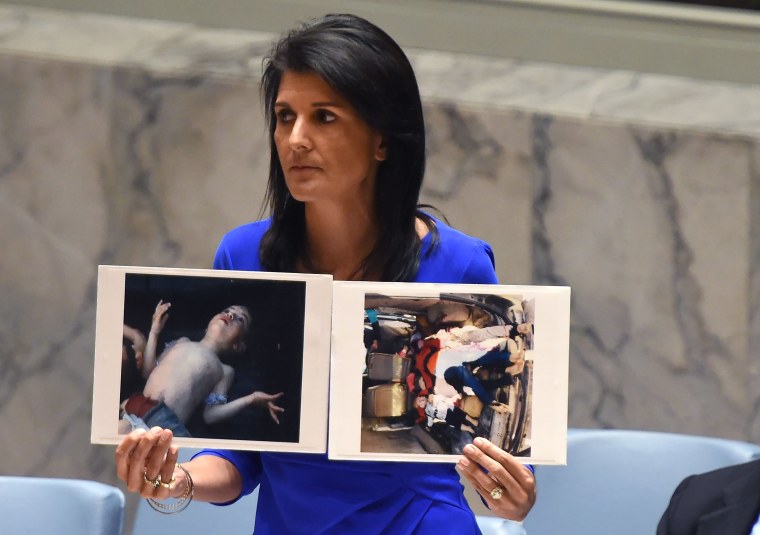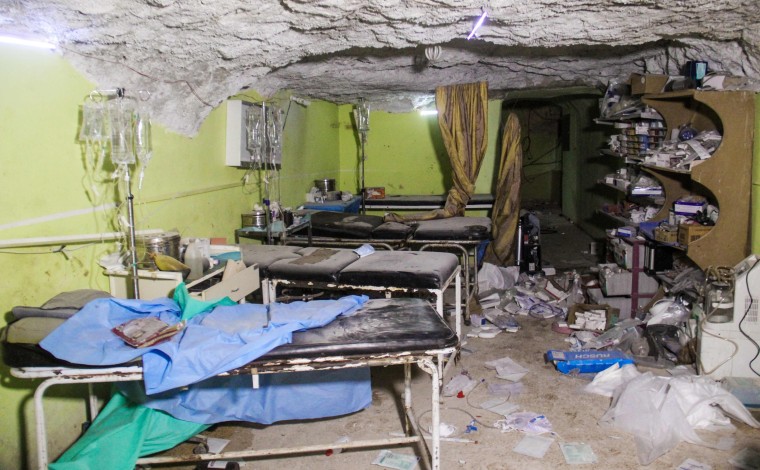U.S. and U.N. officials said Friday that it’s entirely possible that Syria’s Bashar Assad regime not only retained a significant stockpile of nerve agents despite U.N. efforts to destroy them, but may also have regained its ability to manufacture more.
Monday morning’s attack in Khan Sheikhoun, which killed more than 100 civilians, is the first confirmed use of sarin by the Assad regime since an August 2013 attack on Ghouta that killed as many as 1,700 men, women and children.
The Assad regime either used existing sarin or made new stocks of the nerve agent in its attack. Only 10 to 20 grams of sarin are required for such an attack, say military officials, and sarin can be created within a day if the ingredients and equipment are available.
Related: Trump Has Hit Syria With Missile Strikes. What's Next?
In 2013, Syria gave the Organization for the Prohibition of Chemical Weapons a declaration of its chemical weapon stocks and its facilities, which were then destroyed. The size of those admitted stocks was never released publicly, but U.S. intelligence estimated at the time that Syria could have 1000 tons of sarin.

Both American and U.N. officials admit there have always been questions about Syria’s adherence to a 2013 U.S. and Russia-brokered agreement that required Syria “not to develop, produce, retain or use chemical weapons or toxic chemicals as weapons.”
Related: U.S. Officials: Syria Gas Attack Consistent With Nerve Agent
Specifically, a U.S. intelligence official told NBC News, "We have never taken the Assad regime at its word that it declared its entire chemical weapons stockpile. Assad has repeatedly shown that he is willing to use whatever chemical weapons he has retained or reconstituted to attack and terrorize he own people."
Despite the evidence that stocks or equipment still exist, Pentagon officials told NBC News that the U.S. has yet to find chemical weapons storage or production facilities that it can target. Syria was required to destroy all such facilities under the 2013 agreement, but creating small batches of sarin can be accomplished in much smaller facilitties than were destroyed earlier this decade. As one U.S. official noted, "you don't need a lot of sarin to wreak horrible devastation."
Trace elements of sarin and the nerve agent VX were found at a facility that the Assad regime never declared in May 2015, according to Reuters.
While any chemical weapons production infrastructure was banned by the 2013 agreement, there was nothing in the agreement to eliminate the scientific infrastructure, the cadre of scientists and small labs that could be used to re-establish, even on a small basis, a CW program.
The OPCW, a UN agency, issued a statement Friday that reiterated its position from 2016, which was that it was “not able to resolve all identified gaps, inconsistencies and discrepancies in Syria’s declaration and therefore could not fully verify that Syria had submitted a declaration that could be considered accurate” or that it was in compliance with the 2013 agreement.
OPCW also noted how extensive its efforts have been, making18 visits to Syria, holding meetings with Syrian authorities, and visiting former chemical weapons sites.
An OPCW official said the agency has an "ongoing mandate" to investigate the current incident, but added, "The OPCW cannot and will not release information" until its investigation is done. He could offer no timetable on when the investigation will be completed, or whether investigators would be able to visit Syria.
The OPCW has said it has "initiated contact with the Syrian authorities" and requested that all nations "in a position to do so" share intelligence with the organization.

